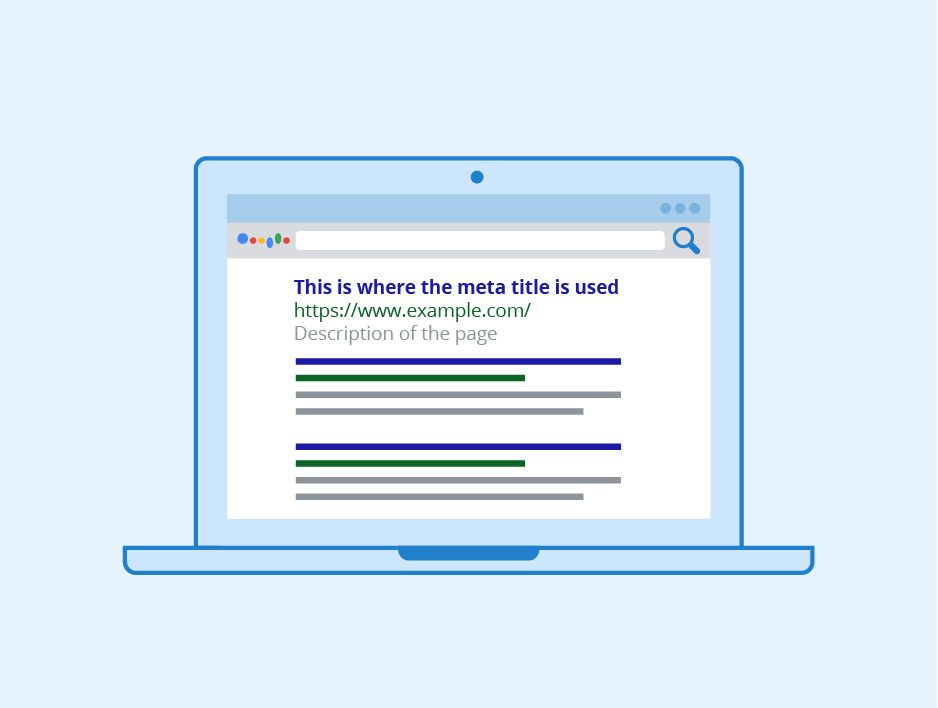The Importance of Meta Title Length
By RG team · 7 min read
Last Updated on June 7, 2023
Wait a minute...

Introduction

Meta tags are an essential aspect of search engine optimization (SEO), and among them, the meta title stands out as one of the most important. Simply put, the meta title refers to the title of a web page that appears in the title bar of browsers and in search engine results pages (SERPs). It is a critical factor that influences both click-through rates and search engine rankings.
However, creating the perfect meta title can be challenging, especially since its length and content affect its effectiveness. In this article, we will explore and answer the question, "what is the ideal meta title length," in-depth. We will also provide you with tips, best practices, and insights into crafting the perfect meta title and how to check and optimize its length.
By the end of this article, you'll have a thorough understanding of the importance of meta title length, how to create attention-grabbing meta titles, and how to optimize these tags for better SEO. So, let's dive in!
Understanding the Importance of Meta Title Length
As mentioned earlier, the meta title plays a crucial role in SEO, influencing both click-through rates and search engine rankings. The title tag serves as the first point of contact between search engines and users, and it is often the first impression that users have of your content.
The importance of the meta title length lies in balancing visibility and relevance. Google uses the meta title to categorize and rank your content, so it's essential to ensure that it accurately reflects the contents of your page. Failure to create a meta title that accurately reflects your content will result in a lower ranking in SERPs and little to no traffic.
However, it's also critical to ensure that your meta title is visible and able to catch users' attention. According to research, an ideal meta title length of 50-60 characters is optimal for balancing visibility and relevance. This range allows search engines to display the title in full, resulting in higher click-through rates and better rankings.
In summary, the importance of meta title length lies in its ability to accurately reflect your content while simultaneously being visible and capable of catching users' attention.
What is the Ideal Length for Meta Title Tags?
As mentioned earlier, the ideal length for meta title tags is between 50-60 characters. Google usually cuts off anything beyond 60 characters, resulting in an incomplete and potentially misleading representation of your content.
Despite Google's recommended range, it's essential to note that there is no one-size-fits-all approach to meta title length. Some industries and niches may require longer or shorter titles, depending on the nature of the content, the intended audience, and the keywords used.
However, the 50-60 character range is an excellent starting point for those who are unsure of how to approach meta title creation. Sticking to this range will ensure that your title displays in full, accurately represents your content, and attracts users' attention.
It's also helpful to note that the meta title should include your primary keyword, reflective of the content on your page. This inclusion will help search engines understand and categorize your content for better ranking. Additionally, it's best to make your meta title descriptive while keeping it concise.
In summary, an ideal meta title length of 50-60 characters is optimal, ensuring that your title displays accurately and attractively. However, the length of your meta title also depends on your industry and niche, and it's essential to strike a balance between being descriptive while staying concise.
Why Keeping Your Title Tags Short is Crucial
Keeping your title tags short is crucial for several reasons.
Firstly, as we mentioned, search engines like Google usually cut off meta titles longer than 60 characters. Any information beyond this point is truncated, resulting in an incomplete and potentially less relevant title.
Secondly, shorter titles are easier for users to read and understand. Users scan through search engines results, and a long, convoluted title is less likely to catch their attention. A concise title makes it easier for users to understand the contents of the page and is more likely to attract a click.
Thirdly, keeping your title tags short ensures that your title displays correctly on all devices. The display area for meta titles varies depending on the device, and a title that's too long may truncate on some devices, affecting visibility and accuracy.
In summary, keeping your meta title short is essential for better search engine visibility, user readability and comprehension, and optimal displaying across all devices.
Crafting a Good Meta Title: Tips and Best Practices
Crafting a good meta title is essential to ensure better visibility on search engines and attract clicks from users. Here are some tips and best practices to create an effective meta title:
Keep it Short and Concise: An ideal meta title should be within the range of 50-60 characters and be concise while still accurately reflecting the content of your page.
Add Your Primary Keyword: Include your primary keyword within the meta title to help search engines understand the contents of your page and rank it better.
Be Descriptive: Your meta title should be descriptive and accurately reflect the content of your page. Avoid using generic or ambiguous language as this will not provide specificity to search engines or users.
Avoid Duplication: Do not use identical meta titles for different pages. If you use the same title tags, it will make it difficult for search engines to understand the contents of your page and rank them correctly.
Use Branding: Adding your brand name to the meta title can help increase brand awareness and distinguish your content from others.
Utilize Emotion and Power Words: Add power words and emotional phrases to your meta titles to evoke a response from users and attract clicks.
In summary, crafting a good meta title entails accurately reflecting the content on your page while staying within the recommended length and including your primary keyword and branding. It should also be descriptive, original, and utilize power words and emotional phrases to attract clicks.
The Role of Keywords in Meta Title Creation
Keywords play a significant role in creating effective meta titles. Including the right keywords ensures that your content appears in search queries relevant to your niche or industry. It also provides specificity to search engines, letting them know your content's exact relevance and ranking it accordingly.
When creating meta titles, it's advisable to include your primary keyword, which accurately reflects the contents of your page. This inclusion helps search engines categorize and rank your content effectively. However, it's also advisable to avoid keyword stuffing, which is the practice of adding too many keywords to your title, resulting in a poor user experience for readers.
It's essential to choose your keywords carefully and ensure that they accurately reflect the contents of your page. This selection should include long-tail keywords that searchers use to find your niche or industry and those that accurately reflect your content's primary focus.
In summary, keywords play a critical role in creating effective meta titles. They provide specificity to search engines and ensure that your content appears for relevant search queries. It's essential to choose your keywords carefully and avoid keyword stuffing for a great user experience.
The Impact of Meta Title Length on Search Engine Optimization (SEO)
Meta titles have a significant impact on search engine optimization (SEO). Creating an effective meta title with the right length, primary keyword, and description ensures better ranking on search engines and higher click-through rates.
As we have already established, an ideal meta title length is between 50-60 characters. This range ensures that the title displays accurately and attractively across all devices and categorizes your content for better ranking. In contrast, longer or shorter titles often hinder your SEO efforts by making your title irrelevant or confusing.
Additionally, including your primary keyword within the meta title ensures that search engines can understand the contents of your page. However, it's essential to ensure that your title is descriptive while still being concise.
Furthermore, creating high-quality meta titles has the potential to impact both click-through rates and search engine rankings. An attractive, attention-grabbing meta title will attract more clicks from users, indicating to search engines that your content is relevant and engaging. On the other hand, a poorly crafted title with a lack of relevance or an unclear representation of your content may reduce click-through rates and negatively impact your SEO efforts.
In summary, the impact of meta title length on SEO is significant. Creating an effective meta title with the right length, primary keyword, and description ensures better ranking and higher click-through rates.



